.svg.png.webp)
Ibero-America (Spanish: Iberoamérica, Portuguese: Ibero-América) or Iberian America is generally considered to be the region in the Americas comprising countries or territories where Spanish or Portuguese are predominant languages (usually former territories of Portugal or Spain). Portugal and Spain are themselves included in some definitions, such as that of the Ibero-American Summit and the Organization of Ibero-American States. The Organization of Ibero-American States also includes Spanish-speaking Equatorial Guinea, in Central Africa,[1][2] but not the Portuguese-speaking African countries. The Latin Recording Academy, the organization responsible for the Latin Grammy Awards, also includes Spain and Portugal as well as the Latino population of Canada and the United States in their definition of Ibero-America.[3]
The prefix Ibero- and the adjective Iberian refer to the Iberian Peninsula in Europe, which includes Portugal and Spain. Ibero-America includes all Hispanic American countries in North, Central, and South America plus the Hispanophone Caribbean, as well as Portuguese-speaking Brazil. Ibero-America makes up the overwhelming bulk of Latin America, but is differentiated from Latin America by the exclusion of the French-speaking country of Haiti, the French overseas departments of French Guiana, Martinique and Guadeloupe, and the French collectivities of Saint Martin and Saint Barthélemy. Belize and Guyana, whose official language is English, and Dutch-speaking Suriname are not considered to be either Ibero-American or Latin American.
Since 1991, the Iberoamerican Community of Nations organizes a yearly Ibero-American Summit meeting of the heads of state and governments of the Ibero-American countries, including Spain, Portugal and Andorra,[4][5] this has since changed to biannually from 2014.
Countries and population in the Americas and Iberian Peninsula
- Spanish-speaking: (430,567,462 speakers)
 Argentina 42,669,500
Argentina 42,669,500.svg.png.webp) Bolivia 10,556,102
Bolivia 10,556,102 Chile 17,772,871
Chile 17,772,871 Colombia 47,425,437
Colombia 47,425,437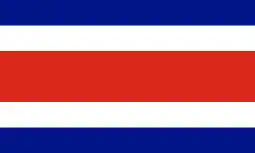 Costa Rica 4,586,353
Costa Rica 4,586,353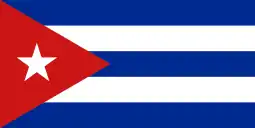 Cuba 11,167,325
Cuba 11,167,325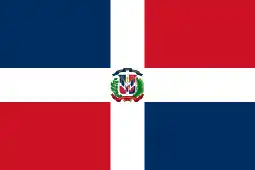 Dominican Republic 9,445,281
Dominican Republic 9,445,281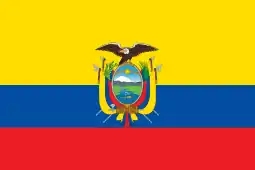 Ecuador 15,223,680
Ecuador 15,223,680 El Salvador 6,134,000
El Salvador 6,134,000 Guatemala 15,806,675
Guatemala 15,806,675 Honduras 8,249,574
Honduras 8,249,574 Mexico 118,395,054
Mexico 118,395,054 Nicaragua 6,071,045
Nicaragua 6,071,045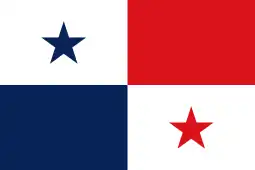 Panama 4,058,374
Panama 4,058,374 Paraguay 6,800,284
Paraguay 6,800,284 Peru 30,814,175
Peru 30,814,175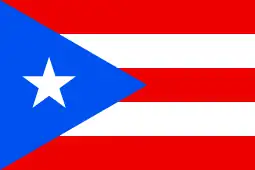 Puerto Rico (U.S. Commonwealth) 3,667,084
Puerto Rico (U.S. Commonwealth) 3,667,084 Spain 48,196,693
Spain 48,196,693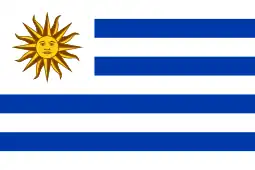 Uruguay 3,324,460
Uruguay 3,324,460 Venezuela 28,946,101
Venezuela 28,946,101
- Portuguese-speaking: (227,661,177 speakers)
See also
References
- ↑ Presentación, Acerca de la OEI, Organización de Estados Iberoamericanos para la Educación, la Ciencia y la Cultura. Accessed on line October 22, 2007.
- ↑ Países Archived 2007-11-12 at the Wayback Machine, Cumbres Iberoamericanas de Jefes de Estado y de Gobierno. Accessed on line October 22, 2007.
- ↑ Abaroa, Gabriel (2019). "The First Twenty Years". 20a Entrega Anual del Latin Grammy. The Latin Recording Academy: 6. Retrieved July 20, 2022.
- ↑ Ibero-American Summit Archived 2007-12-06 at the Wayback Machine, Foreign Office, Republic of Brazil. Accessed on line October 22, 2007.
- ↑ pp. 312–313, Spain: Democracy Regained, Ergasto Ramón Arango, Spain: Westview Press. ISBN 0-8133-2915-9.
External links
- Official website of the Organization of Ibero-American States (OEI) (in Spanish)
- Official website of Ibero-America's Secretariat General (SEGIB) (in Spanish)
- Official website of the Organization of Ibero-American Youth (OIJ) (in Spanish)
- Digital history of Ibero-America from the 14th to the 18th century (in Spanish)
- La Insignia, news about Ibero-America (in Spanish)
- Pensar Iberoamerica, cultural magazine about Ibero-America (in Spanish)
- Official website of El Ojo de Iberoamerica, one of the most important festivals devoted to Ibero-America (in Spanish)